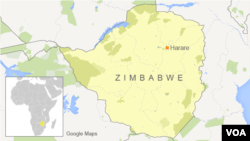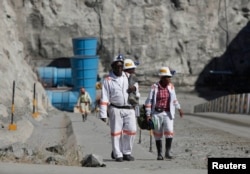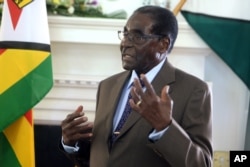VOA's Zimbabwe Service is a reporting partner with the International Consortium of Investigative Journalists, which released the so-called Panama Papers detailing alleged financial misconduct through the Mossack Fonseca law firm.
VOA's original reporting focuses on Zimbabwe's leading platinum mining firm, Zimplats Holdings, and information in the leaked documents alleging that Zimplats used an offshore company to pay management salaries without the knowledge of the Reserve Bank of Zimbabwe and in violation of exchange control laws.
In an exclusive interview with VOA's Studio7 program, Central Bank Governor John Mangudya said no Zimbabwean firm is authorized to operate offshore accounts to pay senior managers who are Zimbabweans or who are working in Zimbabwe.
"Violation of exchange control rules and regulations is a punishable offense," Mangudya said.
Company denies allegation
South Africa's Impala Platinum (Implats), the second-largest miner of the precious metal, is a major shareholder in Zimbabwe's Zimplats.
On Monday, Implats spokesman Johan Theron refuted allegations that Zimplats had engaged an offshore company, HR Consultancy, for the payment of its employees.
“All salaries at Zimplats are funded and paid by the company internally and overseen by the Board Remuneration Committee,” Theron told the Zimbabwe Independent.
Regarding the alleged offshore company, HR Consultancy, he told the newspaper, "We don't know this company and ... Zimbabwe Platinum Mines has never dealt with it."
Government officials were not immediately available for comment, the Zimbabwe Independent reported. It cited its sources as saying the country's tax division, Zimra, was likely to act on information revealed in the Panama Papers.
VOA reached the alleged shell company's accountant, Donna Summers, who offered "no comment."
Mossack Fonseca's corporate liaison officer, Jordan Spencer, declined to reveal client information to third parties.
Former Zimbabwe Finance Minister Tendai Biti called for an investigation into Zimplats managers who allegedly evaded paying taxes on work done in Zimbabwe.
Mangudya said Zimbabwe last year lost more than $500 million in illicit financial flows.
Gabriel Zucman, an economist at the University of California, told South Africa's Independent Online, said in the ICIJ report, "These findings show how deeply ingrained harmful practices and criminality are in the offshore world." He said the release of the documents should prompt governments to seek “concrete sanctions” against jurisdictions and institutions that peddle offshore secrecy.
Zucman is the author of The Hidden Wealth of Nations: The Scourge of Tax Havens.
Sanctioned individuals
The documents also revealed that clients of Mossack Fonseca include 23 people who have had sanctions imposed on them for supporting regimes in Zimbabwe, North Korea, Russia, Iran and Syria.
On Monday, the Panamanian law firm issued a statement that said it never knowingly worked with people with ties to Zimbabwe.
“If for some reason, unbeknownst to us, some company formed by us ended up in the hands of people having such relations for whatever criminal or unlawful purpose, we strongly condemned that situation and took and will continue taking any measures that are reasonably available to us,'' the firm’s statement said.
Meanwhile, in 2009, Mossack Fonseca said it ended its relationship with Zimbabwean businessman John Bredenkamp, the ICIJ report stated.
Bredenkamp, a client of the firm since 1997, had been described in 2002 by a United Nations expert panel as “experienced in setting up clandestine companies and sanctions-busting operations.”
Mugabe 'crony'
In 2008, months before Mossack Fonseca cut ties, Bredenkamp was sanctioned by the U.S. Department of the Treasury for allegedly being a “crony” of Zimbabwe dictator Robert Mugabe and a “well-known Mugabe insider.”
Bredenkamp did not respond to requests for comment, but he has consistently denied allegations concerning him and his companies. He also has denied having supported Mugabe. In 2012, Bredenkamp successfully overturned European Union sanctions against him and his companies, the ICIJ report notes.
Also, the ICIJ report cited a 2015 Mossack Fonseca memo that announced it would drop 35 potentially risky companies "as soon as possible."
The memo cited “recent changes in our organization” and “regulatory matters” in dropping the companies, which included businesses purportedly dealing in real estate in Zimbabwe and Lebanon, as well as oil in Belarus and Russia, and mobile phones, juice, tomato paste and cheese in the Middle East.
The leaked records, known as the Panama Papers, were reviewed by a team of more than 370 journalists from 76 countries.








